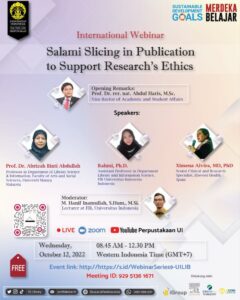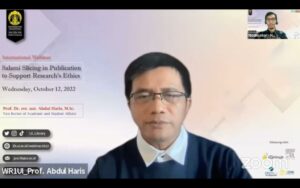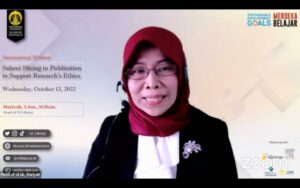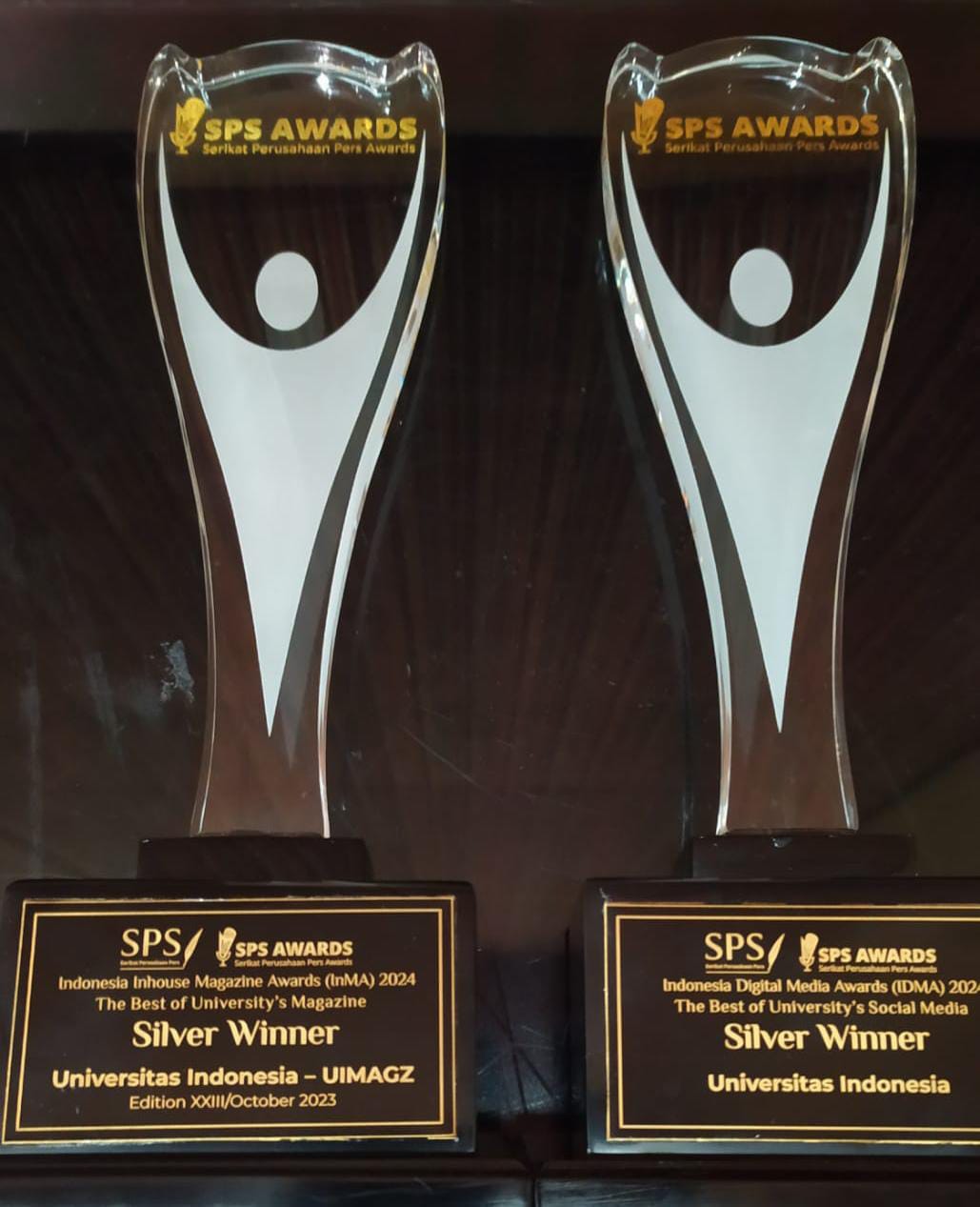
Salami slicing or salami publication is an activity to divide research into several research publications. Salami slicing is usually used to increase the number of research publications so that it has an impact on accelerating citations.
In order to increase knowledge and insight into the ethics of salami slicing, as well as dig deeper into the roles of various stakeholders in the scope of salami slicing, the Universitas Indonesia (UI) Library organized the 3rd International Webinar with the theme: “Salami Slicing in Publication to Support Research’s Ethics“. The webinar invited three speakersProfessor in Department of Library Science & Information, Faculty of Arts and Social Sciences, Universiti Malaya, Malaysia, Prof. Dr. Abrizah Binti Abdullah; Assistant Professor in Department Library and Information Science, Faculty of Cultural SciencesFHum) UI, Rahmi, Ph.D; and Senior Clinical and Research Specialist, Elsevier Health, Spain, Ximena Alvira, MD, Ph.D..

UI Vice Chancellor for Academic and Student Affairs, Prof. Dr. rer. nat. Abdul Haris, M.Sc. provided support to international webinars organized on nine different topics. “More research will improve the university’s ranking, both locally and globally. Research also contributes to achieving SDGs goal four, which is quality education. By increasing knowledge and insight into the ethics of salami slicing, as well as digging deeper into the roles of various stakeholders in the scope of salami slicing, it is hoped that this webinar can provide useful knowledge related to research ethics and produce collaboration in research publications,” said Prof. Haris.

According to the Head of Technical Implementation Unit UI Library, Mariyah, M.Hum., “Universities have a big role in conducting research, whether published in internal repositories or published in other forms, such as books and journals. We hope that librarians can be active and collaborative in research. The target of this activity is the implementation of ethical-based salami publications within the scope of research,” said Mariyah.
On the occasion, Professor in the Department of Library Science & Information, Faculty of Arts and Social Sciences, Universiti Malaya, Prof. Dr. Abrizah Binti Abdullah presented the material entitled “Fostering Responsible Research: Say “No” to Salami Slicing“Regarding the understanding of publication ethics in one category of publication violation in the form of salami slicing such as plagiarism by explaining its forms and prevention. “Sometimes ethical violations can be intentional or can arise simply out of ignorance. Authors should not slice a single article into several very similar articles, in order to obtain a longer list of publications. Unacceptable behavior if the hypothesis, population, and methods are the same and/or if at least one research method is the same. It is considered bad publication practice. Researchers have a responsibility to ensure that their publications are honest, clear, accurate, complete and balanced, and should avoid misleading, selective, or ambiguous reporting,” said Prof. Dr. Abrizah.
The next Speaker from Faculty of Humanities (FHum) Universitas Indonesia, Rahmi, Ph.D., added,“Salami slicing or salami publication usually refers to the submission of different manuscripts and is drawn from data collected from a single research study or a single data collection period. Dividing research into smaller papers is considered a bad practice because readers may not understand the importance of the work if the results are published in several papers; readers who access only one paper may misinterpret the findings; and it is a waste of time,” Rahmi said in her presentation entitled “Salami slicing, and the issue of transparency“.

Regarding the publication, Senior Clinical and Research Specialist, Elsevier Health, Spain, Ximena Alvira, MD, PhD., in his material entitled “Rushing to publish. The other pandemic ” mentions, “Promoting a research culture does not necessarily require huge efforts and resources and some changes can be implemented such as facilitating open discussions; providing and promoting career counseling, coaching and support; and others. The main way to avoid research errors is to practice good research practices.”



